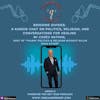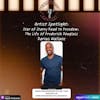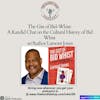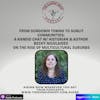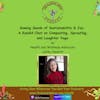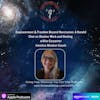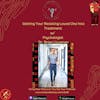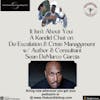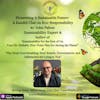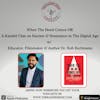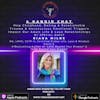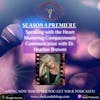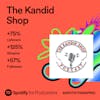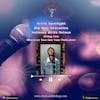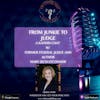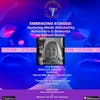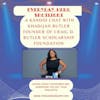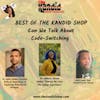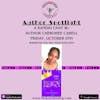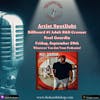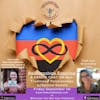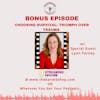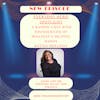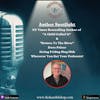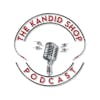Conversations Without Conflict: A Kandid Chat on Politics, Religion, and Conversations for Healing with Corey Nathan
In today’s episode of The Kandid Shop, I had the pleasure of chatting with Corey Nathan, the creative mind behind the "Talkin Politics and Religion Without Killin’ Each Other" podcast. Corey shared his unique journey from growing up in an observant Jewish family to converting to Christianity in his late twenties, which sparked his interest in navigating challenging conversations about religion and politics.
In today’s episode of The Kandid Shop, I had the pleasure of chatting with Corey Nathan, the creative mind behind the "Talkin Politics and Religion Without Killin’ Each Other" podcast. Corey shared his unique journey from growing up in an observant Jewish family to converting to Christianity in his late twenties, which sparked his interest in navigating challenging conversations about religion and politics.
Corey emphasized the importance of engaging in these divisive topics civilly and highlighted the necessity of recognizing the humanity in everyone, even when opinions strongly differ. He shared personal anecdotes about the difficulties and complexities of discussing sensitive issues within his family and his church community, illustrating how these experiences led him to create his podcast.
Throughout our conversation, Corey provided insightful advice on how to approach discussions on politics and religion. He stressed the value of radical curiosity, active listening, and maintaining an open mind, which can lead to a deeper understanding and respect for differing viewpoints.
We also delved into the impact of social media on public discourse, discussing the responsibilities of individuals and platforms in fostering a healthier conversational environment. Corey shared his personal rules for engaging online, emphasizing the importance of accountability and respectful interaction.
The episode was not only enlightening but also deeply humanizing, reminding us all of the power of conversation in bridging divides and the continuous effort required to improve how we communicate on contentious topics. Corey’s perspective and tips are invaluable for anyone looking to navigate difficult discussions with grace and empathy.
Listeners, whether you're new or returning, this episode is a must-listen for anyone interested in better understanding the art of conversation in our polarized times.
Join us on this thought-provoking journey that seeks to repair the world, one conversation at a time, that may inspire you to view the sunrise of opportunity in every challenging debate and embracing our shared humanity.
Connect with Corey:
https://www.politicsandreligion.us/
https://twitter.com/coreysnathan
https://www.instagram.com/coreysnathan/
https://www.facebook.com/coreysnathan
https://www.linkedin.com/in/coreysnathan/
https://www.youtube.com/@politicsandreligion
https://podcasts.apple.com/us/podcast/talkin-politics-religion-without-killin-each-other/id1536169792
Intro Music by: Anthony Nelson aka BUSS
https://music.apple.com/us/artist/buss/252316338
Keep it Safe, Keep it healthy & Keep it Kandid!
www.thekandidshop.com
IG, FB & Tiktok: @thekandidshoppodcast
Ase'
Kandidly Kristin
00:21 - Navigating Politics and Religion Conversations
15:31 - Boundaries of Freedom in Social Media
22:05 - Complexities of Israel-Palestine Dialogue
34:18 - Building Bridges
46:56 - Navigating Divisive Conversations With Radical Curiosity
53:30 - Candid Interview With Corey Nathan
01:02:01 - Presidential Election Season and Website Promotion
KANDIDLY KRISTIN: Hey, hey, hey, Podcast Nation. It is your girl, Kandidly Kristin, and this is The Kandid Shop, your number one destination for Kandid conversations. If you're a new listener, welcome. And if you're a returning listener, welcome back and thanks for your support.
KANDIDLY KRISTIN: So I am super duper excited to sit down today with engaged citizen, creative businessman, executive producer, and host of the “Talkin Politics and Religion Without Killin Each Other,” podcast, Mr. Corey Nathan. So welcome, welcome, welcome Corey to the Kandid Shop.
COREY NATHAN: Kristin, it's so good to be here. Thanks for including me in your conversations.
KANDIDLY KRISTIN: Yes, absolutely. I love the title of your podcast. I love what it's about. And I'm super duper excited just to be having this conversation because politics, religion, two of probably the most divisive subjects that folks do not want to engage in just because it can be so divisive and downright nasty. So I'm super glad to be having this chat with you today because being able to talk about religion and politics in particular shouldn't be something that's difficult to do. We should be able to do it civilly and everybody's voice be heard. So before we get into the meat of our chat, tell me in my list, there's a little bit about who Corey is, your background and anything you want to share.
COREY NATHAN: Oh, well, let's see. I don't know where to start. I was born in Jersey. Yeah, I was born in the, my family was living in New York, but I had, I don't know why I started there. Like, this is going to be a long story if that's where I'm starting, but actually. Yeah. So originally from my, my whole family's from Brooklyn. Um, we moved to Jersey when I was, uh, when I was six or seven and, um, but I was actually born in a hospital in Jersey, but that's another story. The part that I guess is relevant to our conversation is I grew up in a very observant Jewish home. We went to an Orthodox synagogue, kept kosher. We weren't Jewish. We kept kosher the whole bit. I went to Hebrew high school. But then in my late 20s, I think I was 29 at the time, I became a Christian. As you can imagine, It necessitated me going back to my family and having some really hard conversations about why I did this. And at the same time, I was starting to go to church and what I realized pretty quickly was that there was a lot of people I was going to church with whose politics took precedence over their theology. Like the theological convictions that brought me to Christ, that brought me to believe that this Rabbi Yeshua Jesus was the Messiah. Like that wasn't nearly as important to them as which color bumper sticker you have on your car during a presidential election. So I say that because I was having these hard conversations with my dad in particular about religion. And then I started having these hard conversations about politics with my brothers and sisters in Christ in the church. one thing I learned is we don't know how to do this very well. Like we got to figure out how to do this better, have hard conversations about important topics and do it better. So that's what eventually brought me to doing the program we're doing now, Talk Politics and Religion Without Killing Each Other.
KANDIDLY KRISTIN: Without killing each other, because it's possible, like seriously. So I got to ask, Did your background, I read a little bit about the things that you've done like professionally. So it spans a bunch of careers and more importantly, two very different religions. So I guess my question is, did or does your professional and religious diversity inform your perspective on politics and religion and discussing them?
COREY NATHAN: Sort of. So the way that it informs my disposition is that I'm constantly having to navigate very different worlds. The default posture of a lot of guys I go to church with is very different than the default posture of, say, people, one of my businesses is an entertainment-focused business. So a lot of people in that world are very different politically and socially. And having to navigate those two very different worlds, sometimes I find myself having to translate for one or the other, religiously, politically, socially. It's like when I first started going to church, it wasn't just the politics thing. It was sometimes the religious thing. I was in a Bible study with a guy who started a sentence with, why do all you Jews And whatever the rest of the question was, I didn't care because I'm like, wait a second. Why do all us Jews like what? Right. No, there's no end to this sentence that I don't even care about anymore. Right. Like as if number one, as if I speak for all Jewish people, but number two, as if we all act like as one heterogeneous unit. Like, what are we talking about here, man? Right, right. But the other thing too, it's not just like… A lot of us have that tendency to take a data point about somebody, like in my case, I'm Jewish or another data point that I have a business that's involved in entertainment industry. Then we draw this entire narrative about that entire person, but also about an entire people group. All that to answer your question is like, yeah, I've had to navigate different worlds with different prevailing mindsets. So in that way, it's allowed me to have to, it's not allowed me, it's sort of forced me to grapple with, to reckon with questions to who we are as a people. How do we engage with others who don't think like we do, look like we do, come from backgrounds that aren't the same as ours? So I don't know if that answers your question directly, but that's from my experience.
KANDIDLY KRISTIN: It does indirectly, but yeah. So, How do we navigate these things? How do we navigate discussions and particularly disagreements in those discussions without making it, I'm just going to paint this whole group with one brush, or I'm going to be hostile, or I'm going to take whatever you say about my political or religious perspective or opinion as a personal attack?
COREY NATHAN: Yeah, yeah, I think that last part is really important because it's a proclivity I find in myself that I have this I have a tendency to get defensive a lot, even about positions that I don't actually hold. Sometimes it's about, you know, they're talking about people I know and love, you know, even if it's not a position I hold and then I start getting defensive and then I lash out. And, you know, so how do we navigate these conversations without getting defensive or without getting, making generalizations? I think number one, is to see the humanity in each other, and each other's humanity in all of our complexities. I already alluded to it a second ago, where I can't take one data point about you, or maybe you take one data point about me. Maybe it's the color of my hair. I got gray hair. you know, and then draw all these other kinds of conclusions or somebody, you know, I was at a poker game one night and I had to leave a little earlier than everybody else because we were going to church next morning. Well, I said I was going to church and this girl next to me, this lady next to me started railing into me. It was again, it was one of those, why do all of you? She didn't put it that way, but she was basically like making me explain why all these Christians are so Trumpy. And I'm like, Slow your roll, lady. I just said I'm going to church. I didn't say that I'm going to MAGA and stop the steel rally. Let's take each other's humanity first and see each other in all of our complexity. Let me hear your story. So how do we do that? I think one of the ways that we do that is I try to have a a mindset when I'm entering into these conversations that leaves room for the possibility that at some point, I'll be able to say, huh, I never thought of it that way. It comes from this book that a really great writer, great journalist named Monica Guzman, Mani, Mani Guzman wrote called, I Never Thought of It That Way. And if I'm listening with the heart and the head and kind of the soulishness, if you will, that leaves that possibility open that this person will say something that, wow, that's interesting. I never thought of it that way. That's a good kind of mindset to enter into these conversations. And then it's just about like radical curiosity. And if I'm leading with that kind of, seeing the humanity in somebody else and that they might have something that will surprise me and I'm leading with curiosity, I can ask those kinds of questions like, oh, that's interesting. Tell me about like, if they say something, let's say that I disagree with a lot of times our impulses just to like, oh, I disagree and here's why, here's all the facts that prove you wrong. Well, as opposed to, oh, that's interesting. When did you start At what point did you start believing that? Like, that seems like a really strong point of view for you when tell me about your life. Like, how did you arrive at that conclusion? And then now we're having a conversation right now. I'm opening that person up to their story, their humanity. Right. So those are a few ways that come to mind. How can we do this better? And listen, I ain't great at it. Like, I'm still learning. I'm from Jersey. Like, I got sharp elbows coming in all the time, you know. I'm still learning, but these are some of the things that I'm learning along the way.
KANDIDLY KRISTIN: Okay, and those are important lessons. How important do you think it is to not only bring empathy and understanding, but kind of a broader respect for differences to the conversation? Like, okay, they don't look like me, they don't sound like me, they eat different food from me, but they are kind of more similar than different. Because that's a mindset, right? That's a way of looking at something. So I'm always frustrated because everybody doesn't have that mindset. And I'm like, how do we get there from how polarized and divided we are now?
COREY NATHAN: Yeah. So my friend Lisa Joyner, she runs an organization called the Village Square. And very similar to what I'm trying to do with Talk Politics and Religion Without Killing Each Other. Basically, she's been doing this since 2006. And what she does, she started in Tallahassee, Florida. And I call them stunts, but they're really events that she puts on. But one event, she just shut down downtown Tallahassee, set up 100 coffee tables, and she said, here are the rules. We have to have one Democrat or progressive and one Republican or conservative and or conservative on each side of every table. And here's what we're talking about. She set an issue and a couple of really loose guidelines of how to have the conversation. Ready, go. What she's found over and over again, her hypothesis is it's hard to hate somebody up close. It's hard to hate somebody up close. And she's proven it over and over and over again, doing events just like this. So I think that when we're separated from somebody, whether it's via social media or like mental tricks that we impose upon ourselves, mental tricks such as generalization, mischaracterization, and demonization, we can do that from far away. And that'll get us all angry and afraid of each other, you know. But when I find myself going down that road, a lot of times One of the first tools I'll pull out of my toolbox is, hey man, this thing's getting pretty heated. You want to go grab a beer? You want to go get some coffee? You want to grab some lunch? Or if they're on another part of the country, then I'll be like, hey man, let's hop on a Zoom. Let's hop on a call. This thing feels like it's going off the rails. Because it's hard to hate somebody up close.
KANDIDLY KRISTIN: Yes, yes, yes. That is an excellent segue because social media, this digital age that we live in, allows people to expose views and all kinds of other nasty things anonymously. Like, it's just throwing it out and seeing if it'll stick. So in what ways do you feel like social media platforms and, you know, the big ones, Facebook, X, TikTok as long as TikTok's still around. Leaders like community leaders and influencers, how do you think they should be impacting the tone and quality of these discussions or should they?
COREY NATHAN: So I do think that social media companies are part of the problem. However, I want to turn that around a little bit. Solzhenitsyn, I think it was Solzhenitsyn who was a prisoner in a Russian gulag for many years. And he is this 20th century philosopher had some profound wisdom from his experiences. And one of the things he said is, the line between good and evil runs through the heart of every human being. So not to get all like deep and philosophical on you, but I think when it comes to social media, the line between good and evil runs through each one of us, runs through each individual who's using the platforms. So what does that mean? It means that it's on me, right? I have to, I can either create what's called a bespoke reality and have prejudices and only undergird those prejudices Or I can engage in such a way that is a reflection of my values, what we were talking about before. So what I'm doing is I'm trying to be open-minded. I'm trying, but at the same time, discerning. When somebody's a proponent of some kind of wacky theory, I'm not just going to… I'm not allowed to curse on this show, by the way, because I have all kinds of curses running through my brain right now.
KANDIDLY KRISTIN: This is the Kandid shop. So we get Kandid on here. So absolutely.
COREY NATHAN: Okay. All right. So when somebody is a proponent of some wacky theory and all it is, is like, were you doing research or were you just looking shit up? You know? Right.
KANDIDLY KRISTIN: Let's not confuse the two. There's a difference.
COREY NATHAN: There's a difference. So I have to curate and be discerning about what I'm doing and how it's affecting me online. So I have a few rules. You know, what I try to do, like, listen, the politics show is getting kind of big to the point where some people are engaging that I don't have a relationship with. But even with people that are reaching out that I don't know yet, It's like an old pastor friend of mine said, Hey, I don't know everybody yet. You know, we're not friends yet. This is a room full of people and friends I haven't met yet, you know? So what I am, but to your point of what you were saying before, even people I don't know yet or don't have a relationship with yet there, I want to see number one, I'm not, I'm not into the anonymity thing. You have some like wacky, you know, a dark Lord Vader thing, you know, like, I ain't interested in interacting with you because you have no accountability. But if you're, you know, Joe from, you know, Arkansas, all right, at least now I got a starting point. All right, Joe, tell me about you, you know, like interact with them. But for the most part, I try to have interactions with people that either I already have a relationship with, or people who are interacting in a way that I could have a relationship with them. You know, right, right. And I think that's a good start, you know, and then some I do also curate my own threads, you know, if it's on my page on Facebook or Instagram, or, you know, so I say, listen, Nonsense is just going to get muted. Like if you're just spewing nonsense, like we don't have to rehash whether the earth is flat or not. Like, we're not talking about it. And there's plenty of other theories out there that, you know, are still I don't know, being treated with seriousness that just don't need to be treated seriously. Now, lies will also get blocked. And then once we get into threats and violence, that's going to get reported. So those are just loose rules. And it's my thread. So I get to, you know, make and enforce the rules, you know, but it helps keep our, it helps keep our conversations sane. And it still leaves a lot of room for people to express their opinions, you know, for people to disagree passionately. But just some basic rules of the road for me.
KANDIDLY KRISTIN: Yeah, I hear that. I am the same on my thread. I will engage with you. But if you start pulling out those ancient, long debunked tropes and crap, yeah, no, bye. So that's a great segue about freedom of expression versus saying anything you want to say and Having rules on your own thread is awesome because you can enforce them, but if you're not even on social media, in a face-to-face conversation, how do we navigate that dance, that thin line between freedom of expression and respecting other people's opinions when they're being free and expressing?
COREY NATHAN: That's a hard one, but I think it's a really important balance to reckon with, right? So freedom of expression versus what crosses the line. There was this really famous Supreme Court case. I forget the name of the case, but it was It was this group, basically a neo-Nazi group in the 70s that wanted to march in this town called Skokie, Illinois. And Skokie at that time still had many, it was highly populated by Jewish people, not only Jewish people, but a number of Holocaust survivors happened to live there. So there was a lot of uproar about letting these neo-Nazis march and giving, you know, giving them a platform to hold their demonstration. Understandably so, right? However, however much we disagree with speech and certain people's beliefs, the freedom of expression still holds. So what happened with that case? It went to the Supreme Court and Coincidentally, and I think significantly, they were represented by the Anti-Defamation League. Not only that, the lawyers who represented them, who represented the neo-Nazis, were Jewish lawyers. And they said, as much as we find what they believe to be appalling, that's when it's important to defend the basic right of the freedom of speech, the freedom of expression. You know, there is a line, like if they wanted to come and start, you know, shooting guns and causing violence, that's a line, right? But to be given public spaces to hold their demonstration, that's a freedom of speech that's protected in the First Amendment. And we're not testing the freedom of speech when we agree with it. We're testing the freedom of expression when we disagree with it. That's why that case was so important. I think a really good debate is happening right now around college campuses around the country. There are people who are protesting in support of Palestinians, in particular Palestinian citizens in Gaza. I can understand that. I can appreciate that. We can have a conversation about that. Now once we cross a line into blocking a bridge when I'm trying to take my mother, my elderly mother to the doctor, that's no longer about the freedom of speech. When you're occupying space on a permanent basis that you don't have permission to occupy to the extent that you're disrupting students' ability to go to classes, when some of that speech crosses the line into threats of violence, that Jews don't have the right to exist, to the extent that Jewish students have to abandon campus because their safety is threatened, that's crossing a line that's no longer about the freedom of speech. So we can have the conversation about about and even criticize the way Netanyahu, for example, has executed this war, the excesses, perhaps, or, you know, how many tens of thousands of people have died? You know, and I think that's a really, really important conversation to have. And some some of my dear friends disagree with me about what my stance is, me being Jewish with with family members in Israel. I'm going to feel about it a certain way. Um, you know, I'm going to come at it from a different point of view, but let's have the conversation. Let's have the conversation without putting people, other people in danger. Now you lose me when you put other people in harm's way. Now you're starting to lose me. So it's, um, it's a hard issue, but we got to talk about it. We got to talk about it.
KANDIDLY KRISTIN: got to talk about it, because religion and politics aren't going anywhere. And my thing to people is, two things can be true. Like, I can say, I think Netanyahu's going too far, and not And the people of Gaza, the Palestinians, deserve better than what they're getting over there. Like, both of those things to me are true. And neither of them says that means Jews ain't shit and don't deserve to exist, or Palestinians are better. I think a lot of times people filter what you say through the lens of their own experiences, upbringing, background, whatever. And a lot lost in translation.
COREY NATHAN: Yeah, exactly. And it leaving room for the complexity of a really complex situation. You know, yeah, my, my, my family who got there. So I had family that was arriving in that region as early as the 19 teens, right after World War One. And what they were fleeing was pogroms and, and massacres in Eastern Europe, my family had been in a town in Ukraine, Cherniastov Ukraine for about 800 to 1,000 years. But between what was happening in World War I, Bolshevik Revolution, and Cossacks who'd been rampaging through their towns, burning down our houses, raping my ancestors, killing indiscriminately, they had to find other places to live. Now, obviously, some of my family ended up going to New York and Newark, New Jersey. But some of my family was exploring that region. My Uncle Shrulek, my middle name is Scott or Yisrael in Hebrew, So Serulik was exploring the possibility of going to the region that ultimately became Israel. These guys are not colonizers. Anyway, it's a complex situation. We have to allow for that. We have to allow for the fact that Israel suffered the worst massacre of Jewish people since the Holocaust on October 7th, while at the same time, Netanyahu ain't making any friends around the world with the way he's executing the war. Both things are true at the same time. Can we talk about that? I'll tell you one quick, really quick story about how this is done, how this can be done. So I have a very dear friend named Lisa Sharon Harper. She's an incredible woman. She's an incredible social justice leader. She runs an organization called Freedom Road. I help her with her podcast. And the way she describes her podcast is she brings other social justice leaders on and she says the march from Selma to Montgomery is still going on. We're on it. And these are conversations that we're having. So that's my dear, dear friend, Lisa Sharon Harper. Lisa and I disagree about, I wouldn't say we're on different sides, but her efforts have been mostly trying to support Palestinians who've had to suffer both in Gaza as well as Palestinian citizens in Israel. But, you know, she, right after October 7th, she was one of the first, she, I get emotional thinking about it. She, she knows I got family in Israel. So… You might think that somebody like Lisa would call me and hammer me over the head with what all's happening there, the atrocities that Netanyahu is imposing on innocent people and all this. No. What Lisa did is that week, just a couple of days after October 7th, she called me up and she's like, how are you doing, brother? And we talked, we talked for like an hour that day. And I, like, my head and my heart were like mashed potatoes. You know, I still wasn't making sense of what was going on. I was a little afraid that Lisa might want to persuade me about what her point of view was. That's not what she did. She just spent time with her brother, with her, you know, with her friend, her friend, me. And she said, how are you doing, brother? I think that's a good start. That's a good start to your point about showing empathy, even though we feel very differently about what's going on there. Um, you know, she started with the empathy, the human experience, knowing that I'm in pain. And at the time it turned out that one of my extended family was killed on that day. Uh, but all the kids, like I have, uh, nine kids of the age where they were all getting called up to the IDF. So that's, that's just a human experience. And regardless of how passionately she feels about the state of Israel and what happened in 1948 and everything since, she just spent time with her brother. And how you doing, brother? I think that's a good start.
KANDIDLY KRISTIN: That's a good start. That's the common ground that we need to search for because it's there when we're having these interactions, particularly when they get into the disagreeing about something. Yeah. I'm still working on how to do this effectively. How can I, we, us respectfully challenge someone's political or religious views or perspectives without causing offense and without hostility? Because I still struggle with that, especially when the dumbness comes out of a mouth like, what? OK.
COREY NATHAN: There's as many people in the world, there's that many different ways to do it. Meaning every person you talk to is different and unique and they have different sensitivities. So there's a lot of art to understanding what buttons you can push. But what I try to typically do is I try to lead with that curiosity. I try to I'm thinking of a story of Churchill's mother. As a girl and as a young woman, she got to meet two prime ministers in the 1800s in England. And she described those two prime minister, I forget who they were. I think the second one was Disraeli, ironically. OK. But she said the first prime minister, I could understand. She said, I knew why he became such a leader, because as soon as I met him, he just seemed like the most clever person I'd ever met. And then she said, but the second prime minister I met, and I think that was the one that was Disraeli. She said, the second one exceeded the greatness and the profoundness of the leadership of the first one. Why? Not because I found him to be the most clever person in the world, but he made me feel like the most clever person in the world, right? So it's like, I think if we enter into conversations with that radical curiosity that Monty Guzman talks about, and we're leading with that curiosity to understand that person's humanity. And me being a Christian, I kind of take a cue from Jesus. A lot of times when Jesus was interacting with people, he would answer a question with another question. What is good? This rich young leader says, well, why do you call me good? Jesus would answer a question with a question. It's a good way to engage with people because number one, when you ask a question, it begins to open up their assumptions as well as give them an opportunity to share their story. We're storytelling creatures. Their story is their humanity in a way. That's one good way. But at the same time, You're also learning if you wanted to, what I'll call, gently posit. That's what somebody did with me one time. I was talking with these girls who are very far left, progressives. They have this program. I forgot the name of the program off the top of my head, but I was coming on as a right of center, fiscal conservative, also Christian, theological conservative. And we had this great conversation. At one point in the conversation, one of the ladies said, let me gently posit. She disagreed with me about something. So I think any conversation, we might pick our spot. One or two things that we just disagree with, let me gently posit, and this is why. And that's a good start. Whereas if you're just flooding the zone, you're just not going anywhere. Because then it's just two people that are like, it's kind of like two monkeys throwing shit at each other. Yep. Nobody's getting anywhere. Everybody's getting a little more dirty and stinky, but nobody's doing anything, you know? Right, right. So yeah, have a good conversation. Yeah, leading with curiosity, you know, and picking one or two spots where you say, if you do disagree on something, like, hey, let me gently pause it, you know?
KANDIDLY KRISTIN: And actively listening to understand, not just to respond and get your point across. It's like, you're not even hearing what I'm saying. You're just waiting for me to take a breath so you can jump in and attack every and anything I just said. So it's a lesson that's important in most relationships or conversations, but especially in the ones that are divisive. I want to talk a little bit about your podcast, because it's an interesting podcast. I would have never thought of it like, for the first two years of this show, I was like, two things we're not going to do is politics or religion. Not going to do it. And then I realized, why the hell not? Why am I not? I mean, because I guess I did not want to get into those interactions that went off the rails and in the weeds, and the whole message that I was trying to put out got lost in all the animosity and shit. So I wanted to talk a little bit about that. You touched on it earlier, the reasons for creating the podcast, but tell me, when you started it, what was your vision for it?
COREY NATHAN: I don't know if I had a grand vision, but what I did realize is kind of something you're touching upon right now, which is, I realized that a lot of what I think of as screamers and extremists are taking up so much space, this politics and religious space. You know, what Liz Joyner, my friend Liz Joyner calls the village square, our shared public spaces, right? It's about seven or so percent of one extreme and six or seven percent of another extreme. And they're dominating the conversation. It gives the rest of us, 85% of us, the impression that that's what everybody thinks. You're either a screamer on this side or extremist on that side. So I thought, no, man, like 85% of us are what David French calls the exhausted majority. We're just exhausted. Oh, can you guys shut up? Pass the gravy. Can we just enjoy Thanksgiving dinner? But what happens is crazy Uncle Joe, who's the one who's the screamer and the extremist, that's the only content we get about whether it's politics or religion. I say, no, let's take some of that space back. Let's take the exhausted majority, let's wake up and take some of that space back in a public square from the extremists because we need to have these conversations. Politics and religion is basically the way we figure out how to live among each other and do this life thing together. Right. Yeah. So yeah, that was really what I was thinking is like more than any particular issue. We could talk about foreign affairs. We could talk about fiscal and tax policy. We could talk about integration, guns, abortion, all these hard issues. But we're never going to get there if we don't figure out how to talk about it in the first place. If we don't figure out how to see somebody who disagrees with us as a human being with legitimate thoughts and beliefs. Right. So that was my that was my grand vision for the program. And it's been a few years. So we've had the biggest, the coolest thing that I've been blown away by is the people who've been willing to come on the show. I'm so I'm just some schmuck from Jersey, right? I just figured, like, maybe I get to, like, have some friends on that. I graduated high school, which I have, you know, like regular guys like me. But when I've started when I started reaching out to people like high profile journalists and politicians and religious leaders, people started saying, oh man, that sounds like fun. I'll come on the show. I'm like, really? So I had the opposite of the don't you know who the hell I am moment. Like, you know, not like, don't you know who I am? Like, I had the opposite of that. Like, don't you know I'm like a nobody? So we've had some great guests. Sometimes you go a little, like I had, let's see, Adam Kinzinger, the former Congressman. We had David Brooks, one of my favorite writers. We had Nancy French. Oh, we had a brilliant Harvard professor, Danielle Allen. And this is just the last month. Oh, one of my favorite conversations we had was with Fred Guttenberg, who tragically lost his daughter in the Parkland shooting, and Joe Walsh. a former congressman from Illinois. And now Joe is a self, like he calls himself a rabid gun rights activist, right? And Fred, having lost his daughter tragically, is on the other side of that issue. I had them on together. Turns out they're good friends and it turns out they have common goals. But what they really disagree about is how to get to those. They have shared values and shared priorities. Their disagreement isn't like that they're enemies with each other and they hate each other. No, they're good friends. Why? Because they want to get to the same place. But what they disagree with each other about is how to get there, the legislation, how to get there. What a profound conversation. These are the guys, these kinds of conversations, these kinds of relationships, that's what's going to save our democracy, our American experiment. When we have disagreements, passionate disagreements, deeply held beliefs, but we can talk about them and start with the end in mind, start with our shared values. Right. So that's been the coolest thing about the show is having some incredible people, a wide range, diverse array of people. Just this week, we shared an episode. This great lady named Kate Cohen, she writes for the Washington Post, and she wrote a book about why she's an atheist and why she's raising her kids as atheists. Now, me being, you know, having grown up observantly Jewish and now being a Bible-thumping, born-again Christian, you'd think that we'd be at each other, but me and Kate, we just had a great time. I felt like I was talking to her, even though it was the first time I talked to her, I felt like she was an old friend, you know? Of course, we have these disagreements, but it makes me curious about, oh, man, I wish I had that clarity when I was raising my kids. And, you know, we just had a great conversation. So that's what the show's largely been about, is just figuring out how to do this better, man. Talk about our politics and religion and all these hard issues, but doing it better in a neighborly, loving, thoughtful, intelligent, soulful way.
KANDIDLY KRISTIN: Yes, yes. And I think that you're doing that. So I appreciate you for starting the podcast because It's needed. I would have never thought to do it, even though I love talking politics and religion. It's difficult to do, especially now. Excuse me. So speaking of guests and conversations on your show, has there been any surprising outcomes from any of your discussions on the show that challenge your beliefs, assumptions, perceptions?
COREY NATHAN: What comes to mind is a similar conversation that I had with a fellow named Jonathan Rauch, brilliant dude. He's written for the Atlantic, writes for the New York Times. He's just one of the smartest people I know. And he's actually become a friend. On our first conversation, He's also an atheist and our first conversation, he gave me so much to think about that it challenged some of the very foundation of my theological beliefs. Okay. And he's ultimately, He's in the process of writing his next book. His last book, called The Constitution of Knowledge, it really diagnoses what's called the epistemological problem, meaning how we think and how we arrive at beliefs and thoughts and ideas, epistemological crisis. And that's a great book, if anybody, The Constitution of Knowledge. But his next book is gonna be, it's gonna be, we were talking about this, what I call, and I'm gonna forget the four M's, but we were talking about the four M's. He admits that atheists or non-theists have an issue with two of the M's, but theists and people who are religious have a problem with the other two M's. And the four M's are morality, myth, magic, and damn, I knew I would forget one of the M's. Oh, and mortality. Morality, mortality, myth, and I'm messing it up. I'm totally messing it up. Anyway, basically, my question to John was, yes, we talked about being good and being moral, but how do we know that? I don't buy into this evolutionary, like we arrived at it in an evolutionary way. There's something in us that's transcendent. you know, that that transcends just like, observable, you know, physical universe. And that ultimately is what guides our sense of right and wrong as human beings. So John can't necessarily answer that. At the same time, I can't necessarily answer the problem of what he calls murder. And maybe that was the thing. Um, you know, so if there is a benevolent God, he says, why is there murder? Why, you know, the kind of, you know, why do children die of cancer and that sort of thing? I think that we can start to engage on that. And that's a very, very deep question, but just the fact that, or miracles is another one, miracles slash magic. So you really believe that Jesus bodily was raised from the dead, different miracles like that. So John forces me to reckon with my own theological basis, my own theological foundations. And I love those conversations because, listen, at the end of the day, I just want to believe what's true. So I'm not as committed to what the conclusions I've arrived at yesterday or even a minute ago. What I'm committed to is believing what's true. And if I have a great, deep conversation with somebody who challenges that and it forces me to bring more nuance to what my beliefs are, then we're good. So those are the types of conversations that have been most pleasantly surprising. There've been some others that were not as pleasantly surprising, but that's for our next show.
KANDIDLY KRISTIN: Yes, yes, yes, yes. And I want to believe what's true. And I don't want to be so tethered to the beliefs of my parents, my friends, you know, anybody that I can't see past that. When somebody is saying something that's true. And I think people are just like afraid, like that if they engage in a conversation and say, huh, That's interesting that it automatically means they believe it or buy into it wholesale. It's like, okay, just because I can say, hmm, that might bear some thought doesn't mean like wholesale buying into whatever you say or not. I'm just open to considering it.
COREY NATHAN: Right. Right. That's, that's a thing. It's just, you know, you just made me think my core beliefs, the most irreducible two beliefs that I have. One is for me, for me, and I'm not imposing this on anybody else. I've just arrived at the most, one of the most irreducible beliefs I hold is that there is a God. Okay, but two, and this might even, I might believe this even more strongly than the first belief. So one is there is a God and two, I believe this even more firmly and empirically can verify it. One, there is a God, two, I ain't him. Or her, or them, or whatever. So I ain't God, and I can prove that. And it's a good thing, because the universe would be in big trouble if I was God. But me being not God, that's okay, because I don't have all the answers. I ain't right. I didn't come out of the womb with the truth that only God holds. I could be wrong. So if I ain't God, I could be wrong. All right, let's talk about it. Let me figure it out. I'm in the process of trying to figure it out in good will and good faith. So there is a God and I ain't Him or Her or Them.
KANDIDLY KRISTIN: Yep, yep, I like that a lot. They sound like two of my most closely held beliefs. There is God, and it's certainly not me, Lord. So, looking forward, looking ahead, what do you hope for the future of civil discourse and conversations and dialogues across all the divides, not just politics and religion, but all the things that divide us in this society.
COREY NATHAN: One, I hope that Charles Mingus III, my dog in the background, whatever argument he's in with whatever bird that he just saw outside, hopefully he can figure out his differences with, you know, Red Robin or whoever he's barking at. But what do I hope? You know, I think it makes me anxious to think about the world or even the country or my state. But I can think about the conversations that I'm having. So what do I hope for? I hope that I get to do this better. You know, I hope that the people that I come in contact with that I'm a net positive, like in Judaism, there's this concept called tikkun olam, heal the world. Like there's a lot wrong in the world. There's a lot of problems in the world, you know, but we should participate in healing the sickness of the world. Right. So I hope that I'm doing my part in tikkun olam and healing the world. So that's what I hope for, because I have not always been great at it. Sometimes I'm just just an asshole. You know, like, yeah, yeah. Um, which by the way, I got to clarify. So I am a Christian, I am a Bible carrying, Bible reading, believe in Christian. Um, but, uh, I, when I told my pastor one time when he wanted to bring me into some ministry work, I was like, Pastor Dave, I, um, I'm a Christian. I believe it. I believe the whole risen Christ thing. And, but I, I drank, I curse and I play poker. And he goes, he goes, Oh shit, you're going to be one of those. I'm like, okay, we can do some work together. Um, so, uh, yeah, so that's why I, I, uh, I do curse. I, I do enjoy some whiskey and, uh, I do play poker, but, um, that's beside the point, but yeah, to, to answer your question, I just hope I, I I'm in the constant state of improving just what, what I'm doing and my little corner of the world and participating in Tikkun Olam.
KANDIDLY KRISTIN: I think that's awesome. And I'm hoping that this conversation and many more that you'll have that I'll have hope to foster that kind of You know, we don't always have to agree. I don't want somebody that agrees with me about every damn thing. I don't need a clone of myself. It's nice to have somebody else, you know, sitting across the table that you're having a dialogue with. So, yeah.
COREY NATHAN: Unless we're talking about the New York Mets. If you're not a New York Met fan, then we're just going to have to hang up right now.
KANDIDLY KRISTIN: That's there's no disagreement about that. You sound like me and the Steelers. I've been watching the playoffs and I'm like, Jesus, these damn Sixers.
COREY NATHAN: Oh, y'all, y'all upgraded in terms of the quarterback position is going to be an upgrade for you next year. I think for the Steelers, because I'm a Steelers fan.
KANDIDLY KRISTIN: I'm not. Yeah.
COREY NATHAN: Yeah.
KANDIDLY KRISTIN: I think I didn't watch the draft because I get mad. So I didn't watch it.
COREY NATHAN: No. Well, at least you're not a fan.
KANDIDLY KRISTIN: Oh, God, no, no, no, no. Please. No. All right. So my last question to you is. to the people that may hear this. What advice would you give them? We're trying to be better at having these conversations about divisive issues.
COREY NATHAN: I would say number one, give yourself permission to let it be a process, you know, meaning you could enter into one of these conversations and completely face plant, you know, and just be all the things that you just don't want to be and just completely just, you know, embarrass yourself and act like the person that you would hate to see. But that's going to happen. Sometimes somebody's going to get onto your skin and you're just going to you know, those sharp elbows gonna come out. That's all right. It's a process. And that's why I think of this stuff as a practice. I'm practicing this stuff. So every day I wake up and I have an opportunity to practice leading with radical curiosity to practice having that I never thought of it that way type of disposition. you know, to practice seeing the humanity in others, especially when those others are making it really hard for me to see the humanity in them, you know. That's when it's like the spiritual equivalent of putting another, you know, another 45 on the bar. You know, oh man, I'm going to have to hit my personal best right now. But again, like sometimes you're just going to mess it up and that's all right. wake up tomorrow and try again. So be with that curiosity, see that humanity in everybody. And, and, and, you know, think of like, huh, achieve that goal of finding the, huh, I never thought of that way moment with people. So.
KANDIDLY KRISTIN: And know that that doesn't mean that at the end of it, you're not going to still hold the belief you hold. It doesn't mean that because you consider it.
COREY NATHAN: Right. It's right. And if you go into those conversations, disagree with people, they test your beliefs. You could very well come out the other side, still believe in what you believe. but it's a much more deeply rooted belief, a stronger foundation for your beliefs. It's like N.T. Wright, a great historian on first century Israel. Sorry, I'm going into a longer answer again now, but like he wrote five really, it's a five huge books, 600, 800, 900 page books, five volumes so far just on first century Canaan, Israel, Palestine, if you will. And as a Christian, he entered into this history project as an academic, risking the possibility that he'd come out the other side, shaking the very foundation of his theological beliefs. Now, what it did was just it wasn't the opposite. It was just that he has a much more nuanced understanding of of his beliefs. of things like the resurrection, which was an entire volume. He has a much more deeply rooted set of beliefs. Now that might, for somebody who's like an either or, like I live in a town with a guy named John MacArthur, everything is either or, black or white. You know, their faith and their theology is too brittle, right? They can't handle the truth. You can't handle the truth. Well, you know, Johnny Mac can't handle true, but N.T. Wright can because he's done that research and his faith is much more deeply rooted. That's the kind of faith that I'm I'm more drawn to. So, yeah, you might come out the other side, still believe in what you believe, but it'll be a heck of a lot more interesting.
KANDIDLY KRISTIN: Yes, indeed. I agree. I agree. Oh, my gosh, Corey. Time went by way too fast. But I just want to first thank you. Thank you for the podcast. Thank you for being open to having the hard conversations and doing it in a way that doesn't kill anybody. So thank you for that. And thank you for your time. But we're not completely done with our time together. We get to do some fun stuff now and we get to 10 questions. 10 Kandid questions, just some random questions I found on the internet. And there's only one rule. You have to answer them Kandidly. So are you ready? Yeah, let's go. All right. Question one. What is your biggest pet peeve?
COREY NATHAN: Cilantro. I have a moral objection to cilantro. It is evil.
KANDIDLY KRISTIN: Let me tell you something. It tastes like dish soap.
COREY NATHAN: Oh, it's worse than that. It's just evil.
KANDIDLY KRISTIN: Oh my God. And I read that there's like a percentage of the population for whom cilantro tastes like this soup. And I'm in that percentage. It's disgusting. Yeah. Don't put it in my food. Oh my God. Please. Okay. Question two, handshakes or hugs? Depends on a person.
COREY NATHAN: Yeah, that's a trick question. I'm, I'm, I'm human. I ain't God. Right. So there's some people it's, I can do a handshake, but, or maybe just a fist pump, you know, but let me work towards the hug. But if, you know, I prefer the hug, but I ain't perfect. So I'm going to have to work out on it.
KANDIDLY KRISTIN: Yeah. And some people you can see in their face that they don't want to hug. It's like, yeah. Yeah. You're not a hugger. Yeah. Question number three, what challenge in your life shaped you the most?
COREY NATHAN: No, it's arriving at the conclusion that I believe the messiahship of Jesus, that shook me the most. That was the most inconvenient conclusion. Yeah, it really changed the course of my life, as you can imagine.
KANDIDLY KRISTIN: Okay, absolutely. Question number four. Early bird or night owl?
COREY NATHAN: I used to be quite a night owl, but I am just the opposite. I do enjoy getting up at about 5 a.m., sometimes a little earlier, sometimes a little bit later, but like getting my, you know, reading in, getting some meditation in, you know, and making my tea. I do, I do enjoy that, you know, seeing the sun come up. Yeah, I do enjoy that.
KANDIDLY KRISTIN: Yeah, I'm the same. What motivates you? Question number five, sorry. What motivates you to get up in the morning?
COREY NATHAN: Sex. So I've been married to the same girl for now 26 years. We've been together for over 30 years. I'm still trying to impress her. I'm still trying to woo her. I'm still trying to get me some lucky at the end of the day.
KANDIDLY KRISTIN: OK. And listen, morning sex is the best.
COREY NATHAN: We're getting real now, Kristin.
KANDIDLY KRISTIN: Okay, question number six, that was good. Sunrises or sunsets? I think I know this one.
COREY NATHAN: There's something about a sunrise that's kind of special, you know, that sunsets are special, especially, you know, I'm on the West Coast now, so I get to go to the Pacific and see the sunset over the ocean and stuff. But there's something about a sunrise, about a new beginning, you know?
KANDIDLY KRISTIN: Yeah, yeah, I agree. And sunsets are beautiful, like seriously beautiful. But sunrise is just there's something about watching the day start.
COREY NATHAN: I mean, there is one exception to that, though, and that is if you've ever been to Vegas and you've had one of those nights and then you see the sunrise in Vegas, that's like God flashing up. It's like God's flash like, like, what have you been doing? Right. Right. Right.
KANDIDLY KRISTIN: Your mouth is dry, and there’s rocks in your eyeballs.
COREY NATHAN: Yeah. You know what I'm talking about? OK.
KANDIDLY KRISTIN: Question number seven, what's one book or movie that profoundly changed your life perspective?
COREY NATHAN: Oh man, there's so many. I've been reading more these last few years than ever before. So this latest David Brooks book was really profound, How to Know a Person, but the one before that called The Second Mountain by David Brooks, It really did. I was already kind of going down a certain path where I was changing at least what I was doing vocationally with the majority of my waking hours. But reading that book helped provide a vocabulary for me to affirm some of the things that I was already doing and take me further down that road of like climbing that second mountain the talents and abilities and experience that I brought to the table, but refining why I was doing it, the purpose behind what, what things that I was doing. So the 2nd Mountain by David Brooks, at least within the last 5 years, I mentioned Constitution and all, there's some really good ones, but 2nd Mountain, I would say, is right up there.
KANDIDLY KRISTIN: I actually wrote his name down. I'm going to look that up. But yeah, the why is so important because it's what you have and everything goes to shit. You got to hold on to your why. Why am I doing this?
COREY NATHAN: Yeah.
KANDIDLY KRISTIN: Question number eight, French toast or pancakes?
COREY NATHAN: Can I do an option C? Sure. Waffles. Yeah. Well, if I had to choose, you know, I wouldn't choose either one of those. I don't know. Maybe it's because I'm not a big breakfast guy, but like either waffles or every once in a while I get in, like, I'm still Jewish. So I got to have that big cheese and lox and, you know.
KANDIDLY KRISTIN: Oh, yeah. Yeah. Yeah.
KANDIDLY KRISTIN: Yeah. That's still pretty good. And you can eat it, you know, without a fork.
COREY NATHAN: That's that's right. And then and then I'm definitely not getting some lucky that morning because my breath is just like impossible.
KANDIDLY KRISTIN: That's after the lucky. She's going to get up and make it for you happily. So yeah. Question number nine. What do people misunderstand about you the most?
COREY NATHAN: What comes to mind is where I'm at politically. A lot of folks who, for example, Trump supporters, they assume that I'm a liberal, that I'm a Democrat, that I'm a progressive. I'm like, no, man, your extremism is clouding your vision. I'm a Burke-ian conservative, you know, I'm a, I don't know. I mean, so that is, that's misunderstood. At the same time though, some of my progressive friends misunderstand that because I'm a Christian, what the pictures that they see on TV of the guys who have the Jesus save sign next to the noose and singing, you know, chanting, hang Mike Pence, that that's my Christianity and that's my political, you know, disposition. So I get, I get confusion and pushback about folks who misunderstand. Again, it goes back to that taking one data point and generalizing, mischaracterizing and demonizing based on that one data point. So.
KANDIDLY KRISTIN: Yep, yep. I agree. Yep. All right. Question 10, and this question is the same for every guest. How can my listeners connect with you, listen to your amazing podcast, connect with you on social? This is your time to shamelessly self-promote.
COREY NATHAN: Awesome. I appreciate that, Kristin. So easiest way to find a podcast is just type in on your podcast app without killing each other. But remember, the killing, there's no G, you know, because I say that's the end of the title of the podcast, but that's the most important part, right? Without killing each other. So type in without killing each other, killing without the G and that our big purple logo will show up. Follow us. You know, um, and, uh, I, and I'd love to know what you think too. So engage with me online. You can find me on all the socials. Uh, I'm not as active on a tick tock anymore. I just want to see where that goes. Um, we used to do that, but you know, Twitter and LinkedIn and Facebook and Instagram and, and threads, uh, it's all Corey S Nathan at C O R E Y S is in Scott and a T H a N at Corey S Nathan.
KANDIDLY KRISTIN: Gotcha. Awesome. Well, Corey S. Nathan, I want to thank you again. I want to thank you again. Thank you for your time. Thank you for your kandidness, because that's always appreciated in the Kandid shop. And guys, I know y'all weren't writing nothing down. So Corey's contact info website link to his awesome podcast and all his socials is going to be in the show notes. So there's that. And thank you, Corey. Thank you. Thank you. Thank you. Thank you. I hope to have another chat with you as we get deeper into this presidential election season.
COREY NATHAN: A presidential election. What's going on? I don't know.
KANDIDLY KRISTIN: And some other things.
COREY NATHAN: Yeah. All the things, all the things. Well, thank you, Kristin. This was a ton of fun. I really enjoy getting to know you better and having this conversation. So I hope we do it again.
KANDIDLY KRISTIN: Yes, absolutely. And guys, listen, please, please, please don't forget to visit my little website at www.theKandidshop.com. Kandid with a K. Listen to an episode or 10, drop me a review, and please share the show with everybody, anybody, strangers, friends, co-workers, colleagues, whatever. And until next time, I want all of you to keep it safe, keep it healthy, and keep it Kandid.

Corey Nathan
Exec. Producer, Host
Corey Nathan
Engaged Citizen, Creative Businessman, Executive Producer, Host
Corey Nathan started out as a stockbroker by day while studying at a theatre conservatory at night. Since then, he’s been an entrepreneur with one foot in business and one foot in creative pursuits having built such endeavors as a niche executive search firm; a theatre and film ensemble; a residential and commercial service company; a 501c3 to help folks during the pandemic; and most recently a new media/content company.
Much of Corey’s current work is focused on collaborating with people across religious, political and social divides to help understand and repair some of our culture’s rancor. This springs from his personal background, having been raised in an observant Jewish household before becoming a Born-again Christian in his late 20s. This unique trajectory required engaging in fraught conversations about religion with his family as well as strained discussions in the church about politics. Over the last several years, a growing audience has been enjoying engaging, provocative and fun conversations about these subjects on the podcast Corey hosts, Talkin’ Politics & Religion Without Killin’ Each Other. Corey also produces Freedom Road Podcast and Village SquareCast, and consults on a number of other programs in this space.
Corey has been married to Lisa for over 26 years and has 3 kids, Savannah (23), Jackie-boy (20) and Emerson (19) along with the family pooches, Bailey Abigail and Charles Mingus the 3rd. As for rumors of his exploits in the world of Texas Holdem Poker, …
Read More
Check These Out!!
Here are some great episodes to start with!!


